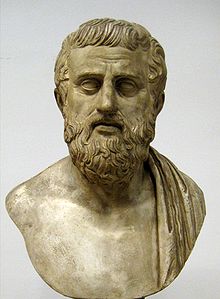 Sophocles (/ˈsɒfəkliːz/;[1] Greek: Σοφοκλῆς, Sophoklēs, Ancient Greek: [so.pʰo.klɛ̂ːs]; c. 497/6 – winter 406/5 BC)[2] is one of three ancient Greek tragedians whose plays have survived. His first plays were written later than those of Aeschylus, and earlier than or contemporary with those of Euripides. Sophocles wrote 120 plays during the course of his life, but only seven have survived in a complete form: Ajax, Antigone, The Women of Trachis, Oedipus Rex, Electra, Philoctetes and Oedipus at Colonus.[3] For almost 50 years, Sophocles was the most celebrated playwright in the dramatic competitions of the city-state of Athens that took place during the religious festivals of the Lenaea and the Dionysia. He competed in 30 competitions, won 18, and was never judged lower than second place. Aeschylus won 14 competitions, and was sometimes defeated by Sophocles, while Euripides won 5 competitions.[4]
Sophocles (/ˈsɒfəkliːz/;[1] Greek: Σοφοκλῆς, Sophoklēs, Ancient Greek: [so.pʰo.klɛ̂ːs]; c. 497/6 – winter 406/5 BC)[2] is one of three ancient Greek tragedians whose plays have survived. His first plays were written later than those of Aeschylus, and earlier than or contemporary with those of Euripides. Sophocles wrote 120 plays during the course of his life, but only seven have survived in a complete form: Ajax, Antigone, The Women of Trachis, Oedipus Rex, Electra, Philoctetes and Oedipus at Colonus.[3] For almost 50 years, Sophocles was the most celebrated playwright in the dramatic competitions of the city-state of Athens that took place during the religious festivals of the Lenaea and the Dionysia. He competed in 30 competitions, won 18, and was never judged lower than second place. Aeschylus won 14 competitions, and was sometimes defeated by Sophocles, while Euripides won 5 competitions.[4]
The most famous tragedies of Sophocles feature Oedipus and also Antigone: they are generally known as the Theban plays, although each play was actually a part of a different tetralogy, the other members of which are now lost. Sophocles influenced the development of drama, most importantly by adding a third actor, thereby reducing the importance of the chorus in the presentation of the plot. He also developed his characters to a greater extent than earlier playwrights such as Aeschylus.[5]
--------------------------------------------------------------------------------------------------------------------
Oedipus Rex, also known by its Greek title, Oedipus Tyrannus (Ancient Greek: Οἰδίπους Τύραννος IPA: [oidípuːs týranːos]), or Oedipus the King, is an Athenian tragedy by Sophocles that was first performed around 429 BC.[1] Originally, to the ancient Greeks, the title was simply Oedipus (Οἰδίπους), as it is referred to by Aristotle in the Poetics. It is thought to have been renamed Oedipus Tyrannus to distinguish it from Oedipus at Colonus. In antiquity, the term “tyrant” referred to a ruler, but it did not necessarily have a negative connotation.[2][3][4]
Of his three Theban plays that have survived, and that deal with the story of Oedipus, Oedipus Rex was the second to be written. However, in terms of the chronology of events that the plays describe, it comes first, followed by Oedipus at Colonus and then Antigone.
Prior to the start of Oedipus Rex, Oedipus has become the king of Thebes while unwittingly fulfilling a prophecy that he would kill his father, Laius (the previous king), and marry his mother, Jocasta (whom Oedipus took as his queen after solving the riddle of the Sphinx). The action of Sophocles' play concerns Oedipus' search for the murderer of Laius in order to end a plague ravaging Thebes, unaware that the killer he is looking for is none other than himself. At the end of the play, after the truth finally comes to light, Jocasta hangs herself while Oedipus, horrified at his patricide and incest, proceeds to gouge out his own eyes in despair.
Oedipus Rex is regarded by many scholars as the masterpiece of ancient Greek tragedy. In his Poetics, Aristotle refers several times to the play in order to exemplify aspects of the genre.[5][6]
---------------------------------------------------------------------------------------
Oedipus at Colonus (also Oedipus Coloneus, Ancient Greek: Οἰδίπους ἐπὶ Κολωνῷ, Oidipous epi Kolōnō) is one of the three Theban plays of the Athenian tragedian Sophocles. It was written shortly before Sophocles' death in 406 BC and produced by his grandson (also called Sophocles) at the Festival of Dionysus in 401 BC.
In the timeline of the plays, the events of Oedipus at Colonus occur after Oedipus Rex and before Antigone; however, it was the last of Sophocles' three Theban plays to be written. The play describes the end of Oedipus' tragic life. Legends differ as to the site of Oedipus' death; Sophocles set the place at Colonus, a village near Athens and also Sophocles' own birthplace, where the blinded Oedipus has come with his daughters Antigone and Ismene as suppliants of the Erinyes and of Theseus, the king of Athens.
----------------------------------------------------------------------------------------
Antigone (/ænˈtɪɡəniː/ an-tig-ə-nee; Ancient Greek: Ἀντιγόνη) is a tragedy by Sophocles written in or before 441 BC.
It is the third of the three Theban plays but was the first written, chronologically.[1] The play expands on the Theban legend that predated it and picks up where Aeschylus' Seven Against Thebes ends.
--------------------------------------------------------------------------------------------------------------
Electra or Elektra (Ancient Greek: Ἠλέκτρα, Ēlektra) is a Greek tragedy by Sophocles. Its date is not known, but various stylistic similarities with the Philoctetes (409 BCE) and the Oedipus at Colonus (401 BCE) lead scholars to suppose that it was written towards the end of Sophocles' career.
Set in the city of Argos a few years after the Trojan War, it recounts the tale of Electra and the vengeance that she and her brother Orestes take on their mother Clytemnestra and step father Aegisthus for the murder of their father, Agamemnon.
No comments:
Post a Comment